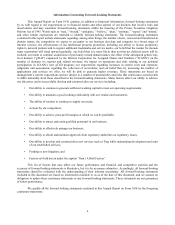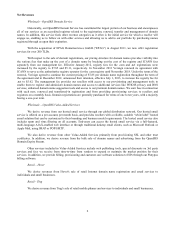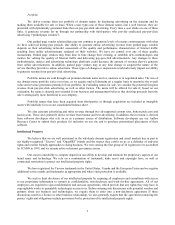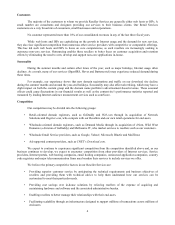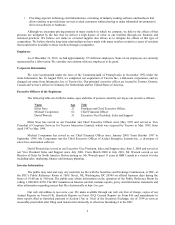Tucows 2012 Annual Report Download - page 14
Download and view the complete annual report
Please find page 14 of the 2012 Tucows annual report below. You can navigate through the pages in the report by either clicking on the pages listed below, or by using the keyword search tool below to find specific information within the annual report.
9
our development and delivery of new services or enhancement of existing services would allow our competitors
additional time to improve their product offerings and provide time for new competition to develop and market
messaging services. Increased competition could result in pricing pressures, reduced operating margins and loss of
market share, any of which could cause our financial results to decline.
If we are unable to maintain our relationships with our customers our revenue may decline.
Our network of resellers is our principal source for distributing services. We also rely on our resellers to
market, promote and sell our services. Our ability to increase revenues in the future will depend significantly on our
ability to maintain our reseller network, to sell more services through existing resellers and to develop our relationships
with existing resellers by providing customer and sales support and additional products. Resellers have no obligations to
distribute our services and may stop doing so at any time. If we are not able to maintain our relationships with resellers,
our ability to distribute our services will be harmed, and our revenue may decline.
Disputes over registration of domain names, the activities of our reseller’s customers or the content of their websites
could subject us to liability and could negatively affect the public’s perception of our corporate image.
As a registrar of domain names services, we may be subject to potential liability for illegal activities by our
resellers’ customers on their websites. We provide an automated service that enables users to register domain names. We
do not monitor or review, nor does our accreditation agreement with ICANN require that we monitor or review, the
appropriateness of the domain names we register for our customers or the content of their websites, and we have no
control over the activities in which these customers engage. While we have policies in place to terminate domain names
or to take other action if presented with evidence of illegal conduct, customers could nonetheless engage in prohibited
activities without our knowledge.
Several bodies of law may be deemed to apply to us with respect to various customer activities. Because we
operate in a relatively new and rapidly evolving industry, and since our industry is characterized by rapid changes in
technology and in new and growing illegal activity, these bodies of laws are constantly evolving. Some of the laws that
apply to us with respect to certain customer activities include the following:
• The Communications Decency Act of 1996, or CDA, generally protects online service providers, such as
Tucows, from liability for certain activities of their customers, such as posting of defamatory or obscene
content, unless the online service provider is participating in the unlawful conduct. Notwithstanding the
general protections from liability under the CDA, we may nonetheless be forced to defend ourselves fro
m
claims of liability covered by the CDA, resulting in an increased cost of doing business.
• The Digital Millennium Copyright Act of 1998, or DMCA, provides recourse for owners of copyrighte
d
material who believe that their rights under U.S. copyright law have been infringed on the Internet. Under this
statute, we generally are not liable for infringing content posted by third parties. However, if we receive a
proper notice from a copyright owner alleging infringement of its protected works by web pages for which we
p
rovide hosting services, and we fail to expeditiously remove or disable access to the allegedly infringing
material, fail to post and enforce a digital rights management policy or a policy to terminate accounts of repeat
infringers, or otherwise fail to meet the requirements of the safe harbor under the statute, the owner may seek
to impose liability on us.
Although established statutory law and case law in these areas to date generally have shielded us from liability
for customer activities, court rulings in pending or future litigation may serve to narrow the scope of protection afforded
us under these laws. In addition, laws governing these activities are unsettled in many international jurisdictions, or may
prove difficult or impossible for us to comply with in some international jurisdictions. Also, notwithstanding the
exculpatory language of these bodies of law, we may be embroiled in complaints and lawsuits which, even if ultimately
resolved in our favor, add cost to our doing business and may divert management’s time and attention. Finally, other
existing bodies of law, including the criminal laws of various states, may be deemed to apply or new statutes or
regulations may be adopted in the future, any of which could expose us to further liability and increase our costs of
doing business.
Domain name registrars also face potential tort law liability for their role in wrongful transfers of domain
names. The safeguards and procedures we have adopted may not be successful in insulating us against liability from
such claims in the future. In addition, we face potential liability for other forms of “domain name hijacking,” including



